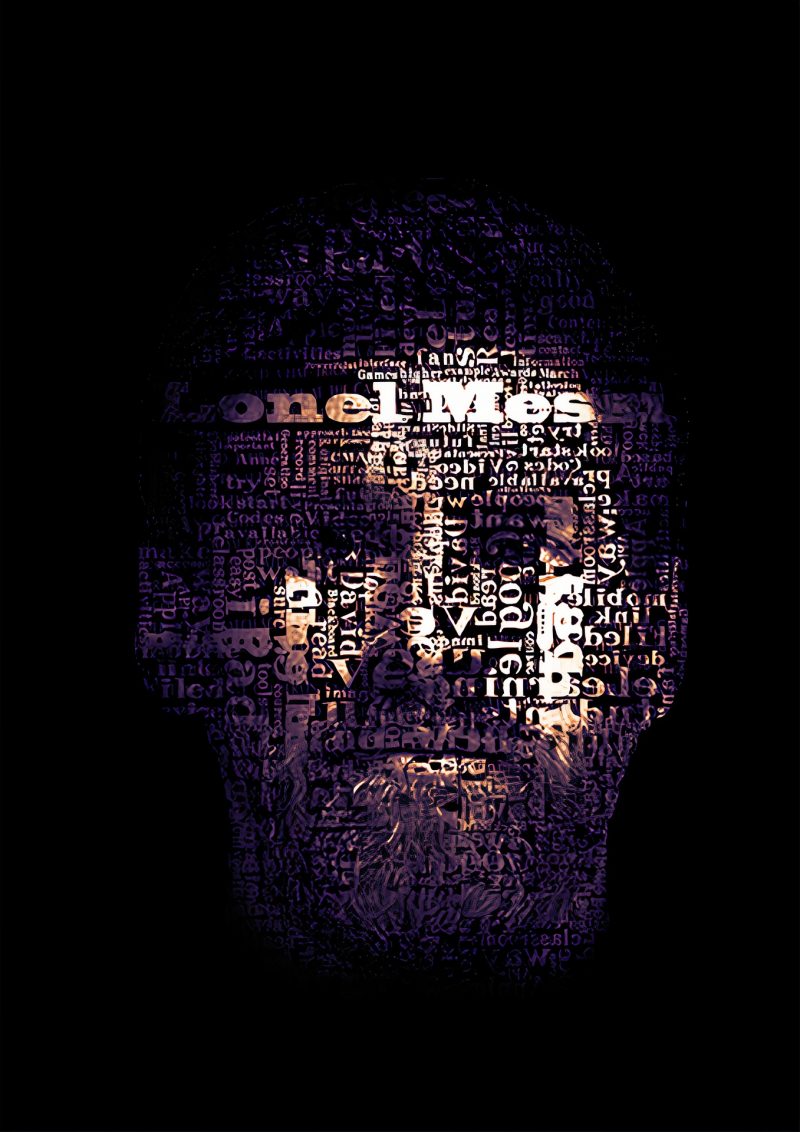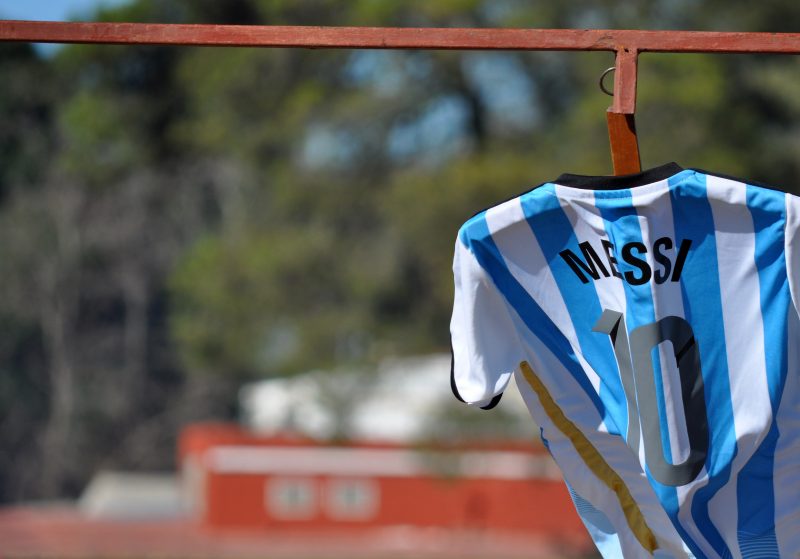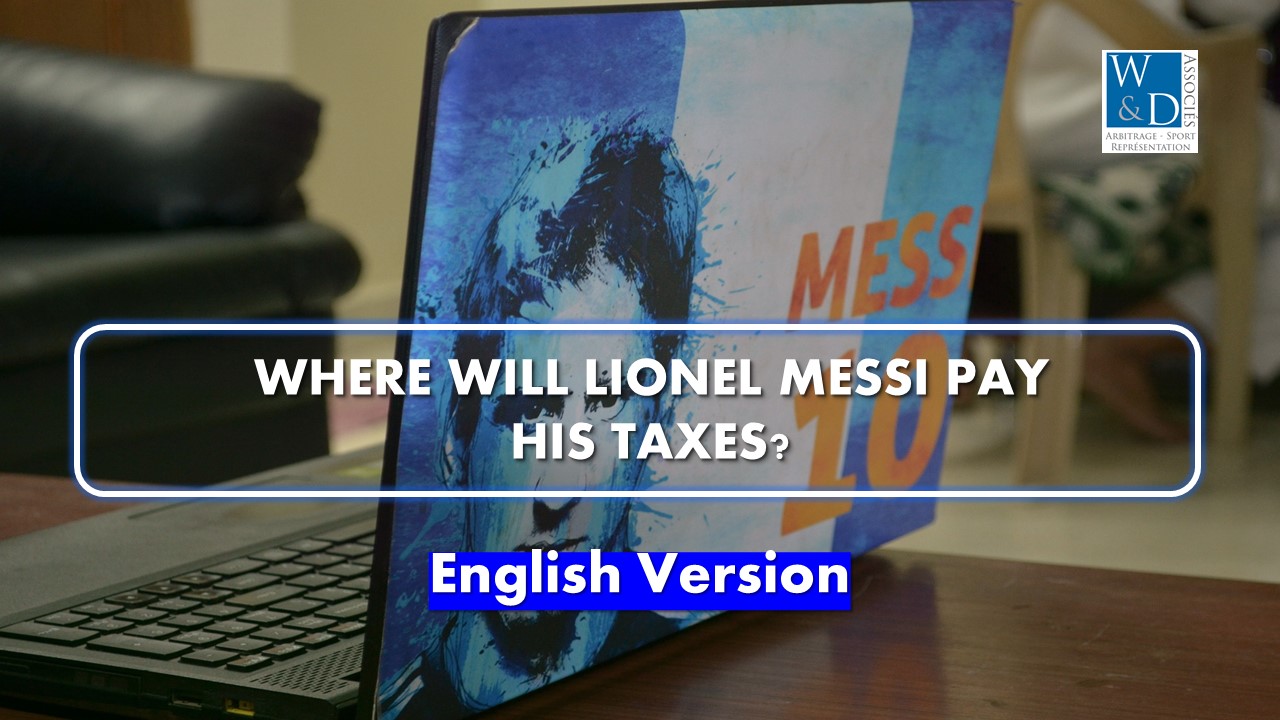Published and translated by Winter – Dávila & Associés.
Paris, 31 January 2022
Author: Emmanuel Lebek
📍Versions of the article available in other languages::
🇪🇸 Versión en Español
🇫🇷 Version Française
Would you like legal advice on sports law? Do not hesitate to contact us!
One of the major events in the world of football this year was without a doubt the arrival of the Argentine star, Lionel Messi, at Paris Saint-Germain. His arrival created a real buzz and was heavily discussed by the media and supporters alike.
When will he arrive in France? How much will he earn? How much will sales of his kit generate? How much will he contribute France’s public finances? How much will the TV rights of “Ligue 1” increase? Will he be paid in crypto-currencies?
So many questions and topics discussed, without anyone having posed the real tax question: “where will Lionel Messi pay his 2021 taxes?” In France? That may not actually be certain, according to some.
The overwhelming majority of readers might also answer: In France of course, since he plays in Paris now!
This is however a complex and politically sensitive issue because it is covered by contractual secrecy on the one hand and by negotiations with Bercy[1] on the other. We will show you that the mere fact that a person exercises his or her sporting art in France is not enough to deduce that he or she will be taxed in that jurisdiction. Criteria such as the player’s main residency or even the centers of economic interests can have a significant, if not decisive, impact.
It is useful to go back in time to understand how we have arrived at such levels of sports income leading to complex technicalities in tax treatment that can make one’s head spin.
1. The genesis of an inevitable success
Every sportsman begins as an amateur in his childhood, without any form of remuneration. He/she may take pleasure in playing, measuring himself and surpassing himself. The sports phenomenon has taken such a rise these last decades, in particular thanks to the advent of television and especially the effectiveness of worldwide broadcasting[2], that the sport inevitably led to professionalization.
Even if the first big international tournaments such as the Olympic Games in 1896[3], the French Tennis Internationals in 1925[4], or the first Football World Cup in 1930 in Uruguay, appeared long before television, sports remained amateur, because they could not develop economically. The founding fathers of sports at the time considered that sports could only be amateur. In reality, the reason for this is probably the impossibility to seriously exploit the economic potential of sports. Due to the lack of effective media coverage at that time, these pioneers of sports organization did not imagine for a moment the potential and economic weight that sport would have in 2021[5] (!).
The media coverage of sports competitions since the 1970s, and especially the 1980s, has favored the emergence of a professional, globalized and profitable sport. The direct consequence of this media coverage has been that sports clubs have generated substantial and ever-increasing profits, whether from television rights or sponsorship revenues, allowing them to better remunerate their athletes to the point of creating real “stars”.
The new status of clubs, resulting from these new sources of income, has redefined the status of sportsmen. From the workers who played for local clubs after work in the 1950s, sportsmen have emerged since the end of the 1990s, some of whom have not only been able to benefit from high salaries, making them sportsmen in the first place, but have also been given opportunities to diversify their sources of income[6].
Since the tax system did not provide for special treatment of these high-income atypical workers, taxation quickly proved to be inappropriate and particularly burdensome for them[7].
It was only after the Laurent Blanc decision[8] that a general rule was defined that was of particular interest only for income closely linked to sports activity. Thus, although the general rule is that an athlete is subject to income tax in the country where the club of which he or she is an employee is located, exceptions have been made based on other criteria, notably relating to the personal life of the athlete.
As for ancillary income that may or may not be directly related to the athlete’s career, its taxation will largely depend on the tax treaties concluded by France, the athlete’s country of residence, and the other states involved.
In order to determine the real taxation of an athlete, it will be necessary to take into account not only his or her tax domicile but also, in certain cases, international tax treaties.
In a highly international world this notion is debated, subject to numerous discussions or even controversies, or simply questioned, since the tax frenzy in reaction to “leaks” has resulted in a very large and continuous influx of new tax rules.
In order to understand and visualize Lionel Messi’s taxation (or non-taxation) in France, it is necessary to consider the question of determining who is taxable in France by explaining what is the tax household (A), the main place of residence (B) and the center of economic interests (C) and their consequences.

Photo: pixabay.com
2. Determination of taxable persons
It is the French General Tax Code that gives us the basis :
“Persons who have their tax residence in France are liable for income tax on all their income”[9]
Article 4 B, 1 of the CGI provides further clarification to define the general framework :
“1. The following are considered to be resident in France for tax purposes within the meaning of Article 4 A:
A. Persons who have their home or principal place of residence in France;
B. Those who carry out a professional activity in France, whether receiving a salary or not, unless they can prove that this activity is carried out as a secondary activity;
C. Those who have the center of their economic interests in France.
(…) “
Naturally, the first question is how to define the “home” called the tax household ?
i) The tax household criterion :
This criterion refers to the place where a person usually resides and which constitutes the center of his or her family interests, without taking into account temporary stays elsewhere, due to his or her profession or exceptional circumstances. It does not matter whether the taxpayer owns or rents the property, as long as he or she has a permanent place of residence.
Taxpayers are considered to have their home in France, even when living abroad, when they still have their family living in France. The tax household is therefore determined by taking into account not only the taxpayer himself, but also his spouse if he is married[10], as well as his unmarried children under the age of eighteen.
Two elements emerge for the qualification of a taxpayer’s household : the place of residence on the one hand, and the center of his family interests on the other hand.
In addition to the law, an abundant and fluctuating jurisprudence has added elements to the notion of tax household.
Long before Lionel Messi, the question was raised by the tax authorities in the Laurent Blanc case, named after the famous 1998 world champion and former coach of Paris Saint-Germain. Mr. Laurent Blanc, a professional football player, had been transferred for the first time in his career from Montpellier HSC to the club SSC Naples in Italy. His contract with the Italian club began on July 1, 1991 and ended on September 21, 1992 when he returned to France to play for Nîmes Olympique. During this period, he played in Italy for a slightly longer period of one year. In addition, Mr. Laurent Blanc held significant stakes in several French companies as well as investment shares in SCPIs[11]. He also owned real estate in France, although he did not own any in Italy.
The question then arose as to whether Mr. Laurent Blanc should be considered a tax resident in France or in Italy. The Administrative Court of Appeal of Lyon recognized in its decision[12] that Mr. Laurent Blanc was taxable in France where the existence of concordant evidence confirmed that his tax household was located. The Administrative Court of Appeal thus considered that Mr. Laurent Blanc “had kept in France the center of his vital interests, and, subsequently, his tax household within the meaning of the aforementioned conventions (if the person has a permanent dwelling in both States, he is considered a resident of the State with which his personal and economic ties are closer)”.
The French Council of State, in a decision of March 17, 2010, nevertheless considered that it was necessary to focus on the “center of his personal life”. This was located in Italy during this period because of his training with the Neapolitan club and official matches in the Italian league. In other words, he was working in Italy. As a resident of Italy and a participant in all the official competitions of his club, his tax household was in Italy and the Italian tax authorities were entitled to tax him (!).
What about the criterion of the main place of residence, is it relevant?
ii) The main place of residence
It is the number of days spent in a country that determines a taxpayer’s principal place of residence. The rule is that a person must stay at least 183 days in a country to be considered a taxpayer of that country. Thus, the 183-day rule, which corresponds to 6 months and 1 day, is in principle but not an absolute criterion for determining tax residence.
In the case of Lionel Messi, this criterion is clearly missing for the year 2021. If for Laurent Blanc his transfer took place on July 1, exactly halfway through the calendar year and not a day later, the Argentine prodigy signed his contract with Paris Saint-Germain on August 10, 2021[13]. He will have been in Spain for at least 222 days, well beyond the 183 days. Since his income in 2021 was mainly from Spanish sources, the French tax authorities would not be entitled to claim any taxes from him for the 2021 Income Tax, unless Spain waives its right to tax, which is unlikely.
The year 2022 should be the first calendar year in which Lionel Messi should be subject to the French personal income tax, except for unexpected transfers[14].
That being said, what is the point of assessing the center of economic interests, and what is the possible impact on Lionel Messi?
iii) The center of economics interests
The concept of center of economic interest is to determine and then designate a place as the place where the taxpayer makes investments, whether it be investments in companies or the purchase of real estate, and from which he/she derives income. As with the tax household, a certain number of elements must be gathered in order to verify whether the criterion of the center of economic interests is really met. This will be the case both for the assessment of the income from the professional sports activity itself and the income from the assets. In contrast to income from sports activities, income from assets is considered to be “passive”. The tax authorities will always compare the size of the assets with the income derived from them.
This brings us back to the Laurent Blanc case, since he owned real estate, including several buildings, as well as holdings in various companies. However, his various French-source incomes were not commensurate with his Italian source incomes, which came directly from his professional activity as a footballer. The Council of State therefore considered that Mr. Laurent Blanc’s center of economic interests was indeed located in Italy for the tax period corresponding to the 1991-1992 season, and that he was therefore taxable on his income not in France but in Italy. In this particular case, it was the “active income” that was more important than the ” assets” aspect, for reasons that could be objectively admitted.
In the case of Laurent Blanc, playing at a time when footballers’ incomes were diametrically different, this decision was maintained. It could be completely different from Lionel Messi whose income from his game is far from equaling those of his image rights, themselves cumulated with the income of his other investments, which by the way are not located in France. According to Forbes magazine, Lionel Messi was the second best paid sportsman in the world with an income of 130 million US dollars, thanks to his sponsorship contracts with Pepsi and Adidas.
It should also be remembered that Lionel Messi arrived in Barcelona from his native Argentina at the age of only 13, on July 1, 2000[15]. Having never left the city of Barcelona and the Blaugranas[16] for more than 20 years, his ties to Spain and his investments, which are undoubtedly numerous there in addition to those in his native country, are likely to influence, if not decisively, at least predominantly, the objective assessment of the center of his economic interests.

Photo: freejpg.com.ar
3. Conclusion
It is therefore understandable that from the taxpayer’s point of view, a certain uncertainty and legal insecurity as to the place of taxation may exist and in some cases the omission of certain details may turn out to be very costly. The French system does not provide much clarity in the application of the tax law. Should we be surprised? No, because the purpose is to give the tax authorities the possibility of a broad interpretation, which is why there is a large number of disputes and case law.
If there is no doubt that the treasury of France will gain, and already has gained, on the arrival of such a player on its territory, it is undoubtedly the indirect tax benefits of his arrival that will be profitable, especially from the sale of jerseys and various derivative products whose VAT rate is 20%. Although these are not taxes as such, but social charges, the so-called employer and employee charges that generate the salary of the Argentine are also a significant injection of money for French Social Security.
From the point of view of Lionel Messi’s personal income tax, the year 2021 should be a year that benefits Spain. It is thus the year 2022 that should be the first real year of taxation in France of Lionel Messi. Provided he does not leave …
If you liked this Sports Law topic, we invite you to share the article, comment on it and also to visit the rest of publications in the social networks and platforms of Winter – Dávila et Associés
If you would like legal advice do not hesitate to contact us! (email: contact@wdassocies.com)
Original language of the article: French
[1] Name commonly used in France to designate the Ministry of the Economy and Finance of the Republic of France.
[2] On January 14, 1973, the very first satellite television broadcast of the “Aloha From Hawaii” concert took place in 54 different countries. We owe this historic moment to an artist who also made history: Elvis Presley, or “The King”.
[3] Jeux olympiques modernes à Athènes.
[4] Also called “The French Open” or « Roland-Garos ».
[5] 90.8 billion Euros in France only. “Le sport, poids lourd de l’économie”, Lequipe.fr, 24 April 2020.
[6] By paying for the use of their image or notoriety.
[7] But also other professions such as artists.
[8] C.E., 8ème et 3ème s.-s, 17 mars 2010, n° 299770, ministre de l’économie, des finances et de l’industrie c/ Blanc.
[9] CGI Art. 4 A.
[10] The tax authorities also take into account the civil union partner.
[11] Real estate investment company.
[12] CAA Lyon 3ème ch., october 26th 2006, n° 012689.
[13] www.transfermarkt.fr.
[14] With however the tax deductions which are applicable to him within the framework of the regime of the impatriate players.
[15] www.transfermarkt.fr.
[16] Name commonly given to players of FC Barcelona.








Leave A Comment